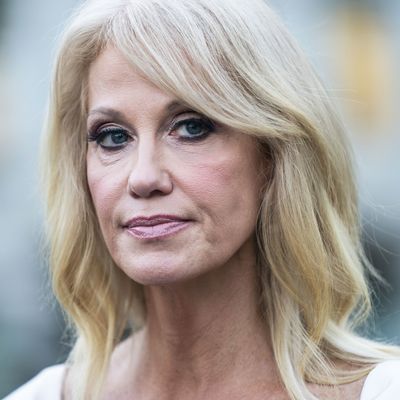
On the night of January 25, the ongoing family drama between Kellyanne Conway and her 16-year-old daughter, Claudia Conway, seemed to hit a breaking point. Kellyanne, who had worked as counselor to President Trump, was accused of sharing a topless photo of Claudia to Twitter. Claudia’s followers informed her on TikTok that a photo had been posted. “Apparently that’s real. The picture’s from months ago, and I’m assuming that when my mom took my phone…because she takes it all the time, she took a picture of that, so that was on her phone…So Kellyanne, you’re going to fucking jail,” Claudia said in a now-deleted video. “I’m assuming my mom took a picture of it to use against me one day and then somebody hacked her or something,” Claudia also said of the now-deleted photo. Police involvement soon ensued. The dispute came in the wake of videos Claudia posted on TikTok earlier in January that appear to show Kellyanne cursing and shouting at her. Claudia has claimed to have called child welfare authorities before but said they didn’t take any actions. In August, Claudia said that she was “officially seeking emancipation” from her parents, remarking: “y’all love to twist everything…i’m not getting emancipated because of my mom’s job.. it is because of years of childhood trauma and abuse.”
While things are clearly turbulent at home, Claudia came to Kellyanne’s defense on Tuesday, saying on TikTok that she didn’t think her mom intentionally shared the photo and that the allegation “hurts me more than it helps.” With allegations of family abuse, nude photos of a minor, and talk of emancipation, there is a lot to unpack. We spoke with several veteran attorneys who explained what’s happening and what could happen next.
What is the legal definition child pornography?
Speaking generally, child pornography is “obviously video or film of children engaging in sexual activity,” explained longtime criminal defense lawyer Kevin B. Faga. However, a nude image of a minor does not necessarily constitute child pornography — it depends whether the tone of said photograph is of a “sexual nature.”
“Parents taking pictures of their children in the bathtub isn’t of a sexual nature. It’s ‘look how cute my adorable children are, I want to preserve this memory.’ That’s not child pornography.” He emphasized that “it has to be sexually explicit” to constitute child pornography, and, obviously, sharing child pornography is illegal.
A person accused of a child pornography crime could face charges, such as possession or distribution, on the state and federal levels. If convicted, they could face serious prison time. Exactly how much would depend on the conviction charges and where they were convicted. At the federal level, a first-time offender found guilty of producing child pornography would face a minimum of 15 to 30 years in federal lockup, for example. A first-time offender found guilty of transporting child pornography could face five to 20 years, according to the U.S. Department of Justice.
Carrie Goldberg, a victims’-rights attorney whose practice frequently handles revenge-pornography cases, provided additional information in a Twitter thread, as well as in an email to Vulture. An illicit image doesn’t have to be published intentionally for it to be a crime, because knowingly having it in the first place, and the circumstances under which it was acquired, could still be a problem.
“New Jersey’s endangering welfare of children laws may also apply,” Goldberg said in an email. “A person commits the crime of endangering the welfare of a child if they knowingly distribute or knowingly store a nude picture of a child that could be used for sexual gratification.” She also said that because Claudia is a minor child, federal child pornography laws and state child endangerment laws would be “more applicable than laws relating to nonconsensual porn.”
Does it matter who takes the photo?
The leaked photo of Claudia was a selfie, some reports said. Faga said that it doesn’t necessarily matter who took a photo in making a child pornography determination. If a 14-year-old female took sexually explicit photos of her own genitals, it could still count as child pornography, even though she was responsible for them. However, it’s quite unlikely she would be charged. Anyone who received or possessed the photo, though, would potentially be exposed to legal problems.
What if an image is shared through phone hacking?
“If a hacker does it, then I guess the argument for the defense lawyer is going to be, ‘We didn’t send it out, my client is not guilty of having disseminated it.’” Again, speaking generally, Faga said, “The question is going to have to come back to: but you were still in possession of this pornographic photograph?”
If an illegal photo is obtained through hacking, it wouldn’t impact the actual charge related to the photo: possession of child pornography is possession of child pornography, and distribution of child pornography is distribution of child pornography. Prosecutors could pursue separate charges that govern hacking under the law.
Goldberg also said on Twitter: “The hacking theory is hard to reckon with. In my experience dealing w/ a lot of different types of csam and revenge porn cases, hackers don’t post from the same account they hacked from. Instead, they steal the image and post it somewhere dedicated to evil content like 4chan.”
“When it comes to child-sexual-exploitation images, publication or dissemination is not a requirement for criminal laws to be triggered. In contrast, with revenge-porn laws, the sharing of the image is a necessary element to trigger criminal laws.”
How, exactly, are the police involved with the Conways?
We don’t know that much about police involvement, other than the case is being investigated. Alpine, New Jersey’s chief of police Christopher Belcolle said in an email: “An investigation is being conducted by the Bergen County Prosecutor’s Office. No additional information can be released.” Belcolle’s email also pointed out that records involving juveniles aren’t public.
When asked for a comment, the Bergen County prosecutor’s office said in an email to Vulture: “We cannot provide any details, but we can confirm that the matter has been referred to our office and that each member of the Conway family has been fully cooperative throughout the investigation.” New York Post photographer Stephen Yang did snap photos that apparently showed police at the Conways’ house on Tuesday.
How is child protective services involved?
In a livestream video in which Claudia, her mom, and a police officer appear to be speaking, Kellyanne can be heard saying that they had interactions with child protective services in Washington, D.C., and the New Jersey Division of Child Protection and Permanency, NJ.com reported. CP&P is the state’s “child protection and child welfare agency within the New Jersey Department of Children and Families,” according to its website. CP&P’s mission is “to ensure the safety, permanency, and well-being of children and support families. CP&P is responsible for investigating allegations of child abuse and neglect and, if necessary, arranging for the child’s protection and the family’s treatment.”
Asked for comment, a New Jersey Department of Children and Families spokesman said in an email: “Due to confidentiality and privacy rules and regulations governing the work of the New Jersey Department of Children and Families, we cannot confirm any investigations or pending investigations regarding alleged child abuse or neglect.”
What is the legal definition of emancipation?
Legal emancipation is much more complicated than kids not wanting to be under their parents’ control. Several lawyers told Vulture that emancipation in New Jersey traditionally involves parents who don’t want to financially support their kids past age 18. (In New Jersey, there are some circumstances when parents have to provide support to their adult children for a few more years, such as if they’re attending high school, undergraduate college, or are disabled.)
Family lawyer Joseph J. Russell Jr. said that he wasn’t aware of any cases in New Jersey where a minor child successfully pursued emancipation from their parents. “I would not say it’s a complete impossibility for a child under the age of 18 to be emancipated, but it would, in my opinion, be highly unlikely,” he said, speaking generally.
“In New Jersey, courts want to maintain, and wherever possible fix, any issues in the relationship between a child and a parent. In my opinion, a Court would do all that it can to restore a relationship with reunification therapy and any other means possible,” he said.
“It’s really more of a sexy headline,” said Jeralyn Lawrence, who founded family and matrimonial law practice Lawrence Law. “It’s very rare for a child to go and become emancipated from their parents. Usually, there’s a presumption that a child is emancipated once they reach the age of 18, but the law is even more broad than that.”
“A child is emancipated when they move beyond the sphere of influence of their parents — when they no longer require their parents’ financial support,” she explained.
In making any type of decision, courts will want to know who will care for the minor.
“If the parents aren’t taking care of you, who’s taking care of you?” Lawrence said. “The state’s not going to want to take care of you. If you’re not self-sufficient and not able to take care of yourself, pay your bills, a court is not going to emancipate you.
“If you don’t want to live there, and you don’t want their support, you better have a plan B for who is going to support you, and where you’re going to live, unless you want to be a ward of the state and be in some type of foster care.”
But could something like a nude photo affect where a minor child lives?
Lawrence said that it depends on whether both parents agree on the circumstances. If both parents agree that it’s not an issue, probably not. “If mom and dad are aligned,” she said, “They have a lot of discretion. It’s hard for the government to intrude on what parents do — unless there’s abuse or neglect, or there’s something that a court is concerned about.”
When both parents aren’t “aligned,” then it could be a different story. For example, if a father were upset about an icky photo that was shared by a mother, he could use that in a divorce or custody proceeding — even if that pic weren’t overtly illegal. He could ask to have the mother evaluated and request that her time with the child be supervised.
So what’s next?
Even though Claudia has almost no likelihood of getting emancipated from her parents — and we don’t know whether that’s even a consideration at this point — she could still try. A child who wants to go this route would sue their parents in family court, and request an order of emancipation, explained Angelo Sarno, a longtime matrimonial attorney. If a child wanted to do this, they could get their own attorney. The minor child wouldn’t have a right to an attorney in this situation, so they’d likely try finding a volunteer or pro bono lawyer, unless they could somehow pay for legal services.
With a potential CP&P investigation, authorities would interview the minor child and their parents. Usually, CP&P investigations are open for at least 90 days. The agency can determine whether allegations of abuse or neglect are “substantiated,” “not established” (meaning there’s not enough evidence), or “unfounded,” Sarno said. If CP&P does find evidence substantiating the claims, they will make a recommendation for addressing problems. If parents comply with their recommendations, there won’t be a court case. But if parents don’t comply with the recommendations, authorities can file a court case.
Minor children can take legal action against their parents, even if they’re still under parental control. “Victims of child sexual abuse material can sue,” Goldberg said on Twitter.
It’s important to remember that Kellyanne Conway has not been charged for any criminal conduct, and the investigation is ongoing. George Conway, Claudia’s father, declined to comment.


